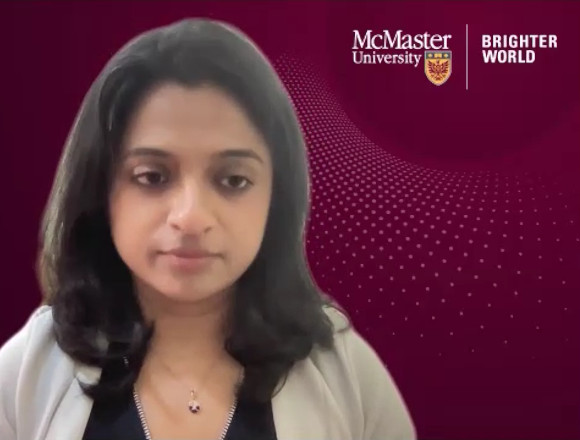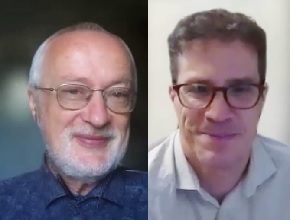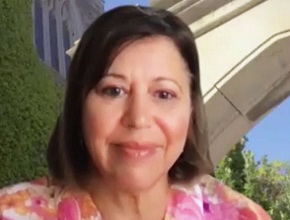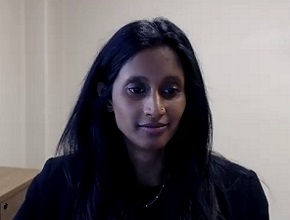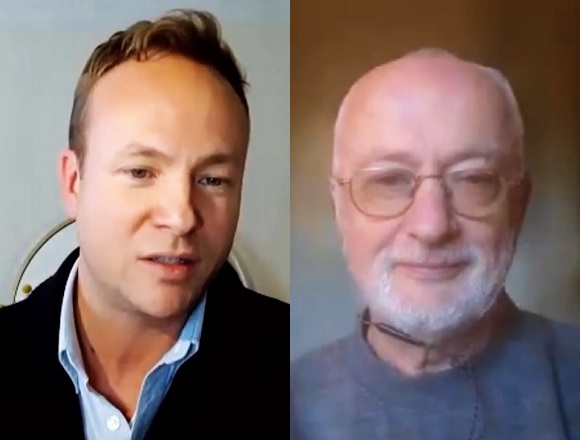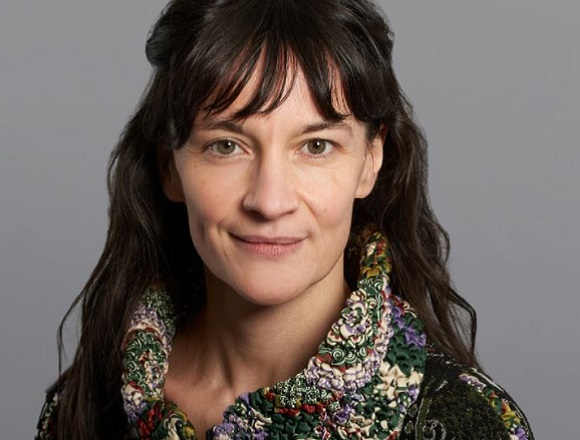Brady Wood, assistant professor of medicine, Division of Education and Innovation, Department of Medicine, McMaster University, joins Dr Roman Jaeschke, professor of medicine, McMaster University, to examine recent findings linking taurine and aging through the lens of evidence-based medicine.
This is the first episode of the Not Quite Evidence Based talks, where a nonclinician and a physician-methodologist scrutinize the facts behind health news that make the front pages.
References
2. Bryan Johnson YouTube page. Accessed November 3, 2023. https://www.youtube.com/@BryanJohnson
3. Zeratsky K. Taurine is an ingredient in energy drinks. Is taurine safe? Mayo Clinic. May 10, 2023. Accessed November 3, 2023. https://www.mayoclinic.org/healthy-lifestyle/nutrition-and-healthy-eating/expert-answers/taurine/faq-20058177
4. Arnold A. What Is Taurine And Why Is It In Energy Drinks? Delish. June 8, 2023. Accessed November 3, 2023. https://www.delish.com/food-news/a44106656/what-is-taurine-energy-drinks/
Brady Wood, MA, MCM: Hi, my name is Brady Wood and welcome to another episode of McMaster Perspective. We’re subtitling this one “Not Quite Evidence Based.” So, Roman, I suppose you and I should introduce ourselves and talk about how we landed here, and then we’ll go into the topic, which is taurine and its relationship to aging.
Roman, I’ll just kick it off by saying that I’m a member of the Department of Medicine at McMaster University, but I’m a nonclinician advisor, and you and I have been working together on the McMaster Textbook. And this topic of things coming up in the popular media was something we were talking about. We see articles all the time, like—maybe another episode will be about this taping your mouth shut while sleeping yields better outcomes for cognitive function and health. We see things like this all the time in the news. Another one of these was this issue of taurine and how it relates to aging based on a study that was in Science [doi:10.1126/science.abn9257], a very reputable journal.
I think there’s a great opportunity for McMaster, launching from its history as the home of evidence-based medicine (EBM) to comment on these articles that are almost reported to the general public as fact. Anything you wanted to say on that, Roman?
Roman Jaeschke, MD, PhD: Well, I like the idea of taping the mouth when sleeping. For some of us maybe a good idea would be to tape the mouth when not sleeping. And that may [mean] avoiding a lot of trouble to a lot of people.
For introduction, Roman Jaeschke, I’m a physician—critical care physician—working in the Department of Medicine and a department that used to be called Clinical Epidemiology and Biostatistics and now is called Health Research Methods, Evidence, and Impact. I’ve been involved in the movement called EBM for the last 2 or 3 decades, and now we are talking about not yet quite evidence-based interventions. So I’m clearly curious about some of them and you had an idea of discussing them in public. What was your take when you’ve seen this taurine article?
Brady Wood: Well, Roman, I guess for me it was sort of interesting because I’m aware it’s in energy drinks, for example, and I’m also someone who is carefully watching news on anti-aging, health, and male hormones.
For example, there’s a tech entrepreneur who’s now running experiments, and they’re well documented on YouTube. They’re calling it the Blueprint Protocol. His name is Bryan Johnson, and he’s trying to reverse aging. He’s doing everything from red light therapy to PPL [push, pull, legs workout routine] and taking hundreds of supplements every morning and starving himself. He looks somewhat impressive as a physical specimen now, but I wonder how much of what he’s doing is evidence based.
So to read this taurine finding that just appeared—I don’t know if it was in The New York Times or something—where I just saw taurine [deficiency] as a driver of aging, and then finding out it was a Science article, I was curious.
There are energy drinks—we probably shouldn’t name them—but many of the energy drinks have this supplement in them. And that seems to almost have been prophetic on their part. Why it was included, I’m not sure, but it was advertised. So a lot of frat boys, and people that are staying up late, and people who want to exercise harder, myself included, you know… I was sort of already on this rhythm of having a sugar-free energy drink around 3:00 PM every day and now I feel like I’m doing something great for myself. But again, I didn’t necessarily trust the reporting, but then to see that it was in Science… I mean, that’s how we got started. I wanted to ask you, Roman, is this really evidence based? Should I be taking this as fact and change my behaviors?
Roman Jaeschke: Two comments on it. Number one, everything is evidence based, depending on how reliable this evidence is and how much you can trust it, how confident you are that a given piece of evidence presents the truth, so to speak.
Because, interestingly, the concept of evidence is very difficult to translate into non-English languages. The origin of the word comes probably from the legal proceedings where people presented pieces of facts either for or against specific thoughts, whereas in a lot of other languages, the evidence is perceived as by itself representing the truth. So if something is based on evidence, it has to be correct. Whereas in our language, the evidence may be very reliable or shaky, very true and believable or something that can be misleading. So the issue is not if there is evidence and whether something is evidence based, but how reliable this piece of evidence is. That’s my first comment on what you are saying.
The other one is you mentioned reputability of the source and we are aware of many experiments run in the past where certain pieces of evidence, so to speak, were presented as coming from different sources, either from a reputable university versus a university nobody heard about, and the same pieces of information were presented as published in a reputable journal versus another journal that nobody believed in or nobody heard about. And the perception of believability was always much in favor of reputation. So it’s not only evidence that convinces people, but not infrequently it’s where it is coming from.
Nevertheless, when I’ve seen this evidence in Science, I was intrigued and I looked into it in more details. You looked at it as well. So even though you’re conducting an interview with me, did it change your behavior at all, what you read in this paper?
Brady Wood: Maybe it’s worth saying, too, I wasn’t really aware of what taurine was, and I’m not actually sure that I know what it is anyway, even after reading the paper.
The paper says it’s an abundant amino acid in humans and other creatures. And basically the conclusion of the article said that it declines as you age. And when they supplemented this in, I think it was worms, mice, and monkeys, it had some effect on age, and health, and life-span. A fairly significant outcome, actually, from what I remember from the article.
Roman Jaeschke: I have to say that I was surprised, frankly, by the scope of the work being done there, because it looks like they looked at so many very sophisticated measurements in a lot of areas, which I will not even quote, because they are characterized by very difficult names and labels. But they looked into genetics, they looked at the products of metabolism and products that are reflections of aging. But they also looked at things like longevity, which is hard to dispute because almost everything, every measurement that is not relevant to direct wellbeing of a person could be questioned.
What I’m saying here is that I do not care much what taurine does to worms, or to fungi, or even to mice, because whatever certain substances do to mice, they may do something opposite to humans. However, the amount of the observations that they made in numerous laboratories around the world, in fact—the names range from France to the United States to India—it was obviously a major collaborative effort. It was very time- and effort-consuming because I learned that the average life-span of mice, for example, is 24 to 36 months. So they had to feed and keep those hundreds of animals in a good condition for a number of years to see if those fed with taurine would survive longer.I looked at it from the perspective of assessing drugs, assessing medications, and when we look at the believability of certain findings, we look at a number of categories. The first category is whether we can consistently reproduce certain findings, whether they point in one direction. And it appears to be fulfilled.
The other one is, are they precise? Because if you see that in one group, say, 1 person dies out of 100, and in the other group 2 out of 100 die, the difference is huge, the difference is 50%, 1 versus 2. On the other hand, it could clearly be a play of chance. So you are looking at something called precision. And their findings were respectably precise in terms of differences in longevity. For example, it appeared that mice that were fed with taurine lived 10% longer, or 2 to 3 months longer, than the mice that were not fed with it.
The two, however, major issues that make me a little bit more shaky in conclusions is, number one, was it a true experiment? And for a true experiment, one would require something that we call randomization, which is a procedure where in this particular case some monkeys will be fed with taurine and some will be fed with some other substance that has no influence on longevity, but which monkey will get taurine and which will not should be determined by chance. I’m not sure if that happened. So, theoretically, especially if somebody was trying to prove the point that they had a priori, you could choose some mice that looked better than the other ones—or healthier—and feed them with taurine and end up with the mice living longer. We call it the risk of bias or risk of preconceived ideas influencing your outcome. And looking at what they presented, I still had difficulty saying, “Yeah, it’s proven, it’s foolproof against bias.”
But the biggest one is the issue of what we call directness. Should human beings take taurine? Should we be taking taurine? Versus a situation where they experimented with taurine, again, in unicellular organisms, in worms, in mice, and in monkeys. The closer you are genetically and evolutionarily to human beings, the more you could trust the data obtained on those species. Do we have enough of them? For the sake of saving time I would say that as a physician and as an epidemiologist, I do not believe I am ready to say, “Hey, this substance should be put in water like fluoride or supplemented like vitamin D in cereals,” and we should not make a public policy on this basis. On the other hand, the personal decisions of people may be quite different and if you are interested in it, I can present it to you as well.
Brady Wood: And now, that said, Roman, what other things... I’m certainly sure none of us are comfortable recommending it, but I would personally be being dishonest if I didn’t say there’s still something quite compelling in this. And, you know, I’m probably going to enjoy my energy drink a little bit more.
Roman Jaeschke: I actually didn’t find yet the reason why taurine is in the energy drinks.
Brady Wood: Let me check right now. I mean, I don’t like to google while we’re on a podcast...
Roman Jaeschke: Maybe we’ll make a second part of it. Maybe we’ll contact energy drink producers and ask why they put it in. And my suspicion is it is a matter of taste. It’s an amino acid, but it’s not... interestingly, it’s not an amino acid that is part of our proteins. It’s called nonessential amino acid, it lacks some groups and it has sulfur groups, for example. But again, why they put it in is a little bit of an enigma to me at this moment. So we’ll find out. We’ll try to find the evidence.
But I’ll also tell you what my first thought here was, and maybe I will ask you: Why would you not take taurine on the basis of what you read? Is there something missing in the information that the Science article provides?
Brady Woods: Why would I not take it based on it? Again, I don’t think the article is necessarily saying... it isn’t saying "start taking." It just says that taurine deficiency is related to aging and supplementing it seems to increase health and life-span in these models. But why wouldn’t I, based on it? For the same reason that I am skeptical of any of these articles, including the mouth taping one or other articles. I think it would be good fodder if we made this “Not Quite Evidence Based” a recurring thing.
Roman Jaeschke: From the perspective of an epidemiologist, again, and a physician, this article concentrates on all the good things, but there is always and almost to everything a different side, a second side, which are harms. So I did spend some time looking for harms, you know, maybe our hair will fall out, whatever is left…
Brady Wood: Well, that would not be good.
Roman Jaeschke: Yeah, that would not be good.
Brady Wood: Actually, I think we’re both.
Roman Jaeschke: I spent some time looking for toxicity and I couldn’t find it. It’s a natural substance abundant in nature, so I do not believe there is a major danger of toxicity, but obviously it would need to be studied. They were giving those animals 1 g/kg of the body weight of mice, mind you. So the average supplement is between 500 mg and 1 g and, frankly, this is close to what we take of it anyway. So the probability of toxicity is low.
The other issue that can stop us from it is cost. I will explain how I know it. It’s rather inexpensive, a capsule costs probably about $0.10. But if the cost was $10 per capsule, you probably would be much more reluctant, wouldn’t you?
Brady Wood: Yes. And the energy drinks... Well, maybe they will go up in cost based on this. But I am reading here that there is a couple of things. I read on the Mayo Clinic website that taurine increases energy levels in cells, so that might be one part of the energy drink.
Roman Jaeschke: Then you explode.
Brady Wood: But then the other thing that I read here is that, and I’ll send this article to you, it’s from a website called Delish: “Taurine suppresses the neurotransmitter receptors, which can help cause a calming effect.” So some physician here in this article is speculating that taurine is included in energy drinks to counterbalance the jitters of caffeine.
Roman Jaeschke: If you want to counterbalance something that you take to generate this effect, I wonder about the wisdom of it. But nevertheless, all this, I would say, is still in indirectness. I’m really not interested in this part. If it’s calming, that’s okay. But the question would be to what degree it calms you. If it blocks neurotransmitters, I’d rather know which one, but in the end I’m really not interested in all those biochemical, genetic, enzymatic changes. I’m interested in how it makes me feel and if it’s going in the same positive direction as longevity, and energy, and health, and so forth? And those data are still lacking to a point of suggesting or recommending it to somebody else. On the other hand, I wonder if you will ask me how I know that taurine costs about $0.10 per pill.
Brady Wood: Please tell me.
Roman Jaeschke: If you insist, I will tell you that I showed this article to somebody very close to me and that person ordered it on Amazon the same day. And I got it in my household now for a few weeks. What it teaches me, again, is the main premise of EBM, which is that the evidence does not make decisions for you. It’s people who make decisions. So we look at the evidence, whatever the facts for or against something are, we judge it and we make personal decisions, which sometimes are rational, I would hope, and sometimes are less rational. To disclose, as much as I’m a physician and I am not able or willing to recommend it to others, some of the people in my family and immediate closeness decided to take it. And there you go, before any definitive trials.
Brady Wood: So, Roman, I guess through that lens of EBM, let me ask you if my summary is correct or if you would summarize this differently. It sounds like we’ve got an article here that says some promising things about taurine in terms of health benefits and extending life-span, not in any humans and not in a kind of true experiment sense of having some of the animals that didn’t have it and some that did. So, ultimately, we would say this is in terms of decision-making not quite evidence based, if one was to say one should start taking taurine.
Roman Jaeschke: Right. I think that your summary is correct. And the question… from the personal point of view, people may make decisions as they wish at this stage probably at not too high risk. On a population level, epidemiological level, societal level, we are not ready, and the next step in the spirit of EBM would be at least a few years of large-scale experiments when some people will get the taurine supplement and some will get identically looking pills containing a substance that is not active, called placebo. The people who will get it versus not get it will be determined by chance—we call it randomization—which would be followed for a period of time. And from what I see certain things like energy level, awakeness level, concentration, we probably could measure within weeks. But for some other things, including some diseases, obesity, lipids, heart conditions, we would need months to years. And in some people, [to assess things] like longevity, we would need years to follow. So, a complex thing. Frankly, I wouldn’t mind to propose such a study because the data so far, although indirect, are quite intriguing, to say the least.
Brady Wood: Thanks, Roman. I don’t know how this will get circulated, but we’ll make links to the articles about this available some way as well, or at least just point to where they are.
Roman Jaeschke: Right. Again, looking at it from an epidemiological perspective, or a more scientific perspective, or EBM perspective, making links to a specific article is one of the frequent problems. We should summarize the evidence. We should look for all available evidence and on that basis link people to it. Because if we link that to 2 positive articles, forgetting 10 negatives, well, that generates its own trouble.
Brady Wood: Good point, good point. Roman, I like that we’re in kind of uncharted territory. This is like the cryptozoology of EBM. We’re talking about Bigfoot, the Loch Ness Monster, and other unproven things of which there are apparitions. So let’s keep going.
Roman Jaeschke: Okay. Thank you very much for this interesting for me talk.
 English
English
 Español
Español
 українська
українська

